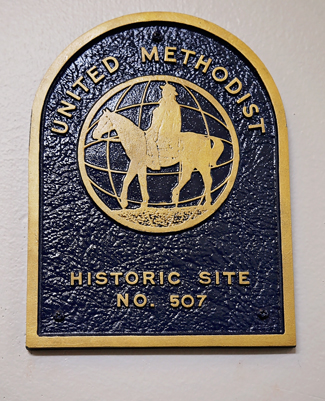McKendree University is on United Methodist Church Historic Site Registry
 (LEBANON, Ill., April 14, 2016) - The United Methodist Church has designated McKendree
University as a national historic site for 188 years of service in higher education.
Founded in 1828, McKendree is the oldest college with continuous ties to the United
Methodist Church.
(LEBANON, Ill., April 14, 2016) - The United Methodist Church has designated McKendree
University as a national historic site for 188 years of service in higher education.
Founded in 1828, McKendree is the oldest college with continuous ties to the United
Methodist Church.
“We are grateful for this special designation and know that it is just one more symbol
and sign of the Methodist legacy and influence felt through the years on this campus
and by the many students who pass through these doors,” said Rev. Tim Harrison, McKendree
chaplain.
The University joins several notable congregations, campgrounds, buildings and locations
on the United Methodist historic registry, said Dr. Paul Stroble, UMC elder and chair
of the Illinois Great Rivers Conference (IGRC) Commission on History and Archives.
He spoke at the April 1 commemoration ceremony at Bothwell Chapel, joined by Rev.
Dr. Roger Grimmett, UMC Mississippi River District superintendent, an ex officio member
of the university Board of Trustees and a 1983 McKendree graduate.
The university’s history is closely tied to early American Methodism in Illinois.
Its founders— Edmond Ames, Bishop William McKendree, Peter Akers and Peter Cartwright
among them—were circuit riders, the traveling preachers who ministered to pioneer
settlers.
“In 1827 at the fourth session of the Illinois Conference, a discussion took place
about the inadequate training for men who were called to important positions of leadership
as Methodist preachers. Not a single member of that group, not even the bishop, had
a college education,” noted Rebecca Schreiner, director of Holman Library at McKendree.
Determined to provide educational opportunities for their successors, they formed
a committee to establish a seminary in Lebanon. “They discussed the purpose of the
school, the raising of funds, the purchase of a site, and the kind of building it
would be. Before they adjourned, Articles of Organization were formulated, which are
still preserved in our university archives,” Schreiner said.
In 1828 circuit rider Edmond Ames opened the Lebanon Seminary in two rented sheds
for 72 students. In the same year Bishop McKendree—the first American-born bishop of the Methodist church—deeded 480 acres in nearby Shiloh Valley as an endowment. In 1833 Rev. Peter Akers was appointed the first president of the newly named McKendree
College.
In 1835 it received one of the first charters granted to independent church colleges
by the Illinois legislature, which then met in Vandalia. A second, more liberal charter
was granted in 1839, under which it still operates. The college was renamed McKendree
University in July 2007.
Immediately following the historic site plaque dedication on April 1, a reception
was held to honor retiring volunteer archivist Linda Isbell, of O’Fallon, Ill. The
McKendree alumna worked in Holman Library’s Pioneer Room since 1995, cataloging and
preserving historic books and curating items from early Methodism and early McKendree
history.
-McK-
